UP FOR DEBATE: The Lesser Evil
In These Times is dedicated to providing an accessible forum for strategic debate on the Left. In this Up for Debate series, we host a range of views on what has become a divisive question: how to approach voting in the November presidential election.
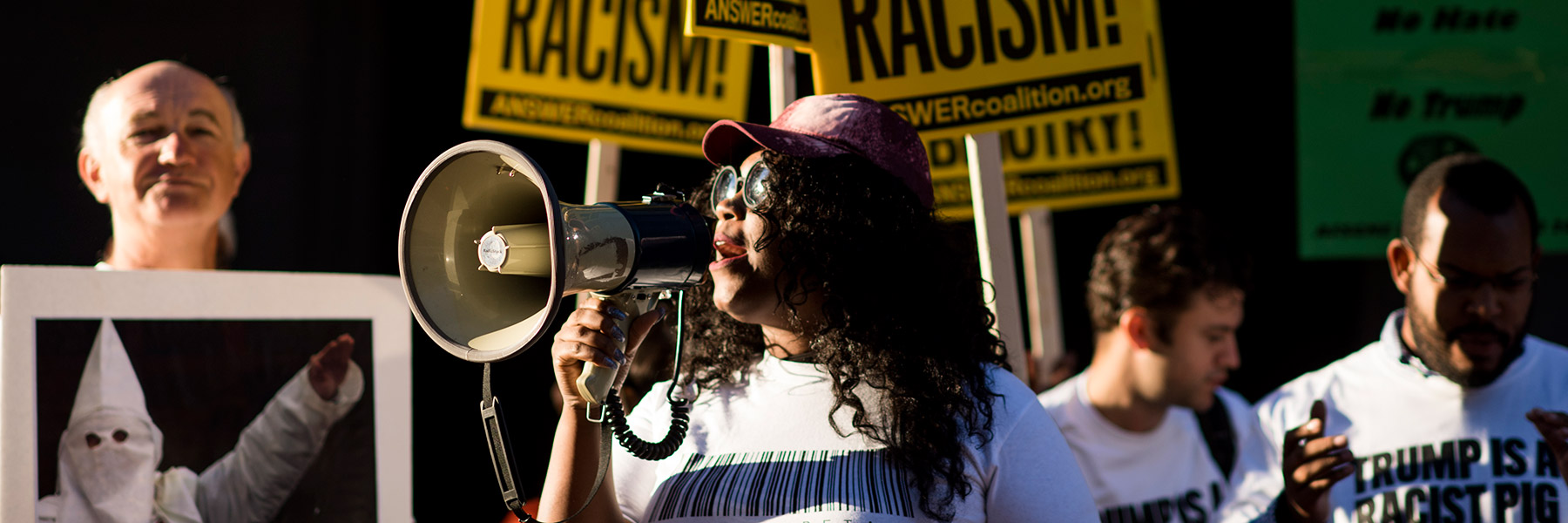
Photo By Bill Clark/CQ Roll Call
Dump Trump, Defeat Racism and Misogyny, Build the Left
An open letter to the left from 47 grassroots organizers
October 17, 2016
Right now it feels like we’re in an “emperor has no clothes” moment. A lot of us see something really clearly, but few of us—radical and revolutionary organizers—are willing to say it out loud.
So we’re going to say it. Defeating Trump in the presidential election is a top priority for the left. And at a minimum, that means mobilizing voters for Hillary Clinton in swing states even if you vote for another candidate in a safe state. We’ve got to beat Trump and Trumpism while building movements that will fight, resist and disrupt a Clinton administration that will be militaristic and pro-corporate.
Most of us on the left feel about the Clintons the way we feel about leftovers that have been sitting in the fridge for too long: repulsed. NAFTA, mass incarceration, Palestine, the 2003 Iraq invasion, legitimizing the coup in Honduras, cozying up to Wall Street—take your pick of crimes that can be laid at the Clintons’ feet. And judging from the DNC, the Clintons will talk a good game on economic inequality while resorting to jingoism and nationalism throughout the election. But if the Clintons’ neoliberal politics induces nausea, then Trump's brew of racism and misogyny makes us projectile vomit.
Many of our friends believe that Democratic and Republican parties, and their candidates, are both worthless, and the left should focus in this election on breaking the two party system; or they believe that a Clinton administration will just create more working-class disaffection and strengthen the extreme right. We disagree. And when we talk to people—whether community activists or simply our neighbors—about this election, we need to be clear about the stakes. When we hear people say they don't know who to vote for because both candidates are equally bad, we get worried.
At every opportunity, Trump has doubled down on racism, sexism and bigotry, to the delight of David Duke, the American Nazi Party, and others like them. A Trump victory—do we even need to say this?—would embolden hard-core racists, Islamophobes, misogynists, and anti-immigrant groups, while promising an assault on workers' rights and intense, perhaps very violent repression of the inspiring social movements that have erupted in the past several years. If you have any doubt about this, listen to his speech at the Republican National Convention.
As many have emphasized, we're not voting for the candidate; we're voting for the terrain our movements operate within. This election will set the stage for our future struggles. In the past eight years, movements— from Black Lives Matter to Fight for Fifteen, Occupy Wall Street to Standing Rock and Ni Uno Màs—have surged and changed the way we talk about everything from police accountability to student debt to deportations to the minimum wage. And more and more activists have learned that it is not enough to elect “good” politicians, that social change requires constant struggle. Under a Trump administration, our movements will be back on the defensive: His Supreme Court appointments alone could mean rollbacks on voting rights, reproductive rights, labor rights, and immigrant rights. And we can expect people to revert to blaming social inequality and systemic injustices mainly on Trump and the Republicans.
What kind of left do we want?
Can we leave the business of defeating Trump and electing Hillary Clinton to others —liberals or progressives—while we concentrate on the genuinely radical work of stoking protest and opposition from Clinton’s left? Can we bank on Trump's low poll numbers? It depends on the left we want to build. The vast majority of union activists and people of color view this election as a battle against open racism. If we want to build a left that engages and is part of these sectors—if we want a left that contends for leadership among the country as a whole—then we can’t afford to leave the basic task of defending democratic rights to others, even as we continue to criticize and protest.
Ideally, we would work to defeat Trump without volunteering or working directly for Clinton’s campaign. We should be able to send people to kick-ass grassroots organizations in swing states to help with election day turnout, organize phone banks from safe states to support their efforts, or maintain a presence at the polls to ensure voters of color are not intimidated. But whatever we choose to do, sitting out this election is not an option.
As we mentioned at the beginning, defeating Trump is not enough. We need movements strong enough to fight a Clinton administration on several fronts—whether Israel/Palestine, free trade agreements, climate change, a $15 minimum wage, or the prison-industrial complex. And neutralizing the appeal of the far right means we need to both strengthen our movements for racial justice and win over white workers to a progressive class politics as an alternative to Trump’s racist economic nationalism. Finally, we need to build a left that can help anchor a visionary alternative to corporate Democrats. It won’t be easy, but we’ve come this far. Let’s defend what we’ve got in this election, and keep our eye on collective liberation.
In unity and struggle,
Moumita Ahmed, Millenials for Revolution*
Michael Albert, Z Communications*
Thomas Assefa, LeftRoots*
Austin Belali, organizer
Gary Broderick, Durham Association of Educators*
Meghan Brophy, Young Democratic Socialists*
Andres Celin, youth organizer
Reece Chenault, national coordinator, US Labor Against War*
Jung Hee Choi, nonprofit consultant
Christine Cordero, LeftRoots*
Chris Crass, anti-racist author and educator, Kentucky
Sendolo Diaminah, Freedom Road Socialist Organization*
Dan DiMaggio, labor journalist, Democratic Socialists of America*
Louis Head, Southwest Organizing Project*
Ashkaan Kashani, Young Democratic Socialists
Jason Negrón-Gonzales, labor activist
Abdul-Basit Haqq, Local 1067, Communications Workers of America*
Gregory Hom, SEIU 1021*
Sarah Hughes, PSC-CUNY, AFT 2334*
Lynn Koh, War Times*
Emily Lee, LeftRoots*
Charles Lenchner, People for Bernie*, act.tv*, Democratic Socialists of America*
Jack Suria Linares, immigrant rights and labor activist, Democratic Socialists of America*
David Littman, University of Georgia Young Democratic Socialists*
Timmy Lu, environmental justice organizer
Meredith Martin-Moats, McElroy House: organization for Cultural Resources*
Rev. Allyn Maxfield-Steele, faith-based organizer, Virginia
Ariel Morales, housing organizer
Shelby Murphy, Lamar University, Young Democratic Socialists*
Kayla Pace, Young Democratic Socialists*
Shameka L. Parrish-Wright, It's What We Do Special Project, LLC*, Carl and Anne Braden Memorial Center Board*
Cynthia Peters, LeftRoots*
Jardana Peacock, Liberatory Leadership Project*
Maria Poblet, executive director, Causa Justa/Just Cause*
Manju Rajendran, Anti-Oppression Resource and Training Alliance*, Ready the Ground Training Team*
Rapheal Randall, youth organizer
Merle Ratner, Vietnam Agent Orange Relief and Responsibility Campaign*
Spencer Resnick, LeftRoots*
Marc Rodrigues, Student/Farmworker Alliance*, Young Workers: Tampa Bay*
Ashley Rodriguez, Sanders national delegate, El Paso, Texas; Democratic Socialists of America el Chuco del Norte chapter*
Joel Solow, Vote Mob*
Alex Tom, community organizer
Carla F. Wallace, Showing Up for Racial Justice Action, Inc.*
Jayanni Webster, community organizer, Memphis, TN
Zoë Williams, community organizer, Denver, CO
Winnie Wong, People for Bernie*
Chris Zepeda-Millan, scholar activist
* organization affiliation for identification purposes only
Up for Debate: The Lesser Evil
The Left Deserves Better Than Jill Stein
by Kate Aronoff
More Than a Protest: Why Voting Green Counts
by David Cobb
Voting For Hillary is a Privilege—One Not Shared By the People She’ll Bomb
by Marc Daalder
3 Reasons to Vote for Hillary Clinton That Have Nothing To Do with Hillary Clinton
by Thomas Geoghegan
How To Vote When There's No Lesser Evil
by Leonard C. Goodman
How a Trump Presidency Would Unleash a Torrent of Racist Violence—And Devastate the Left
by Arun Gupta
Up for Debate: The Lesser Evil
Read the rest of this special Up for Debate series on the 2016 presidential election:
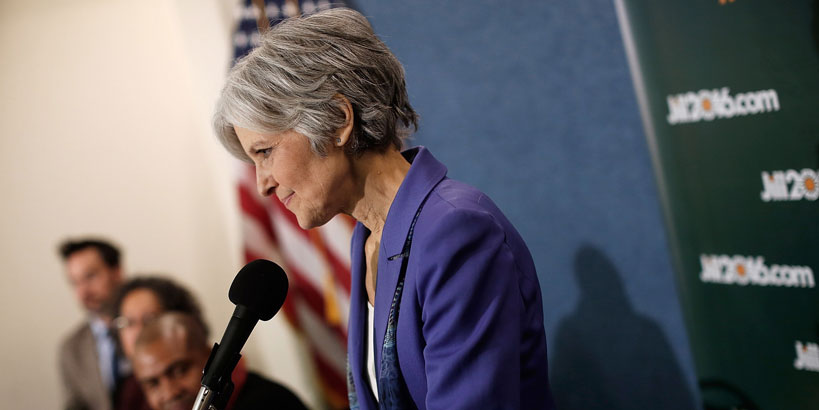
The Left Deserves Better Than Jill Stein
by Kate Aronoff
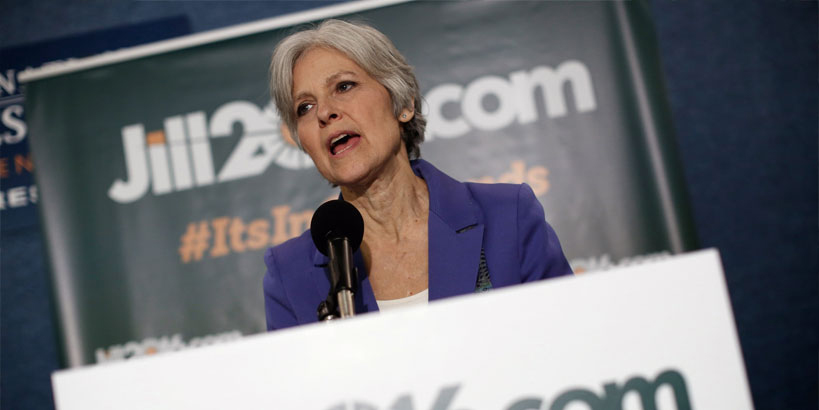
More Than a Protest: Why Voting Green Counts
by David Cobb
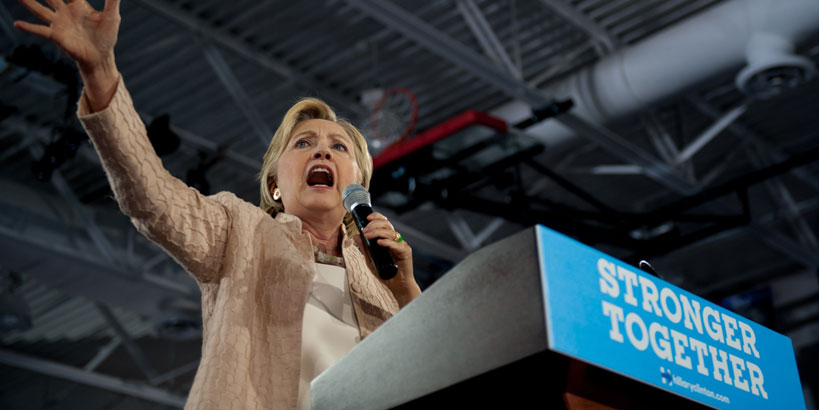
3 Reasons to Vote for Hillary Clinton That Have Nothing To Do with Hillary Clinton
by Thomas Geoghegan
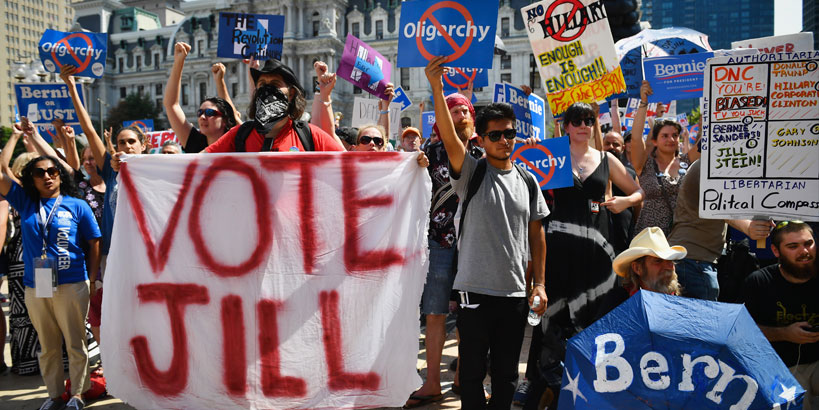
How To Vote When There's No Lesser Evil
by Leonard C. Goodman
